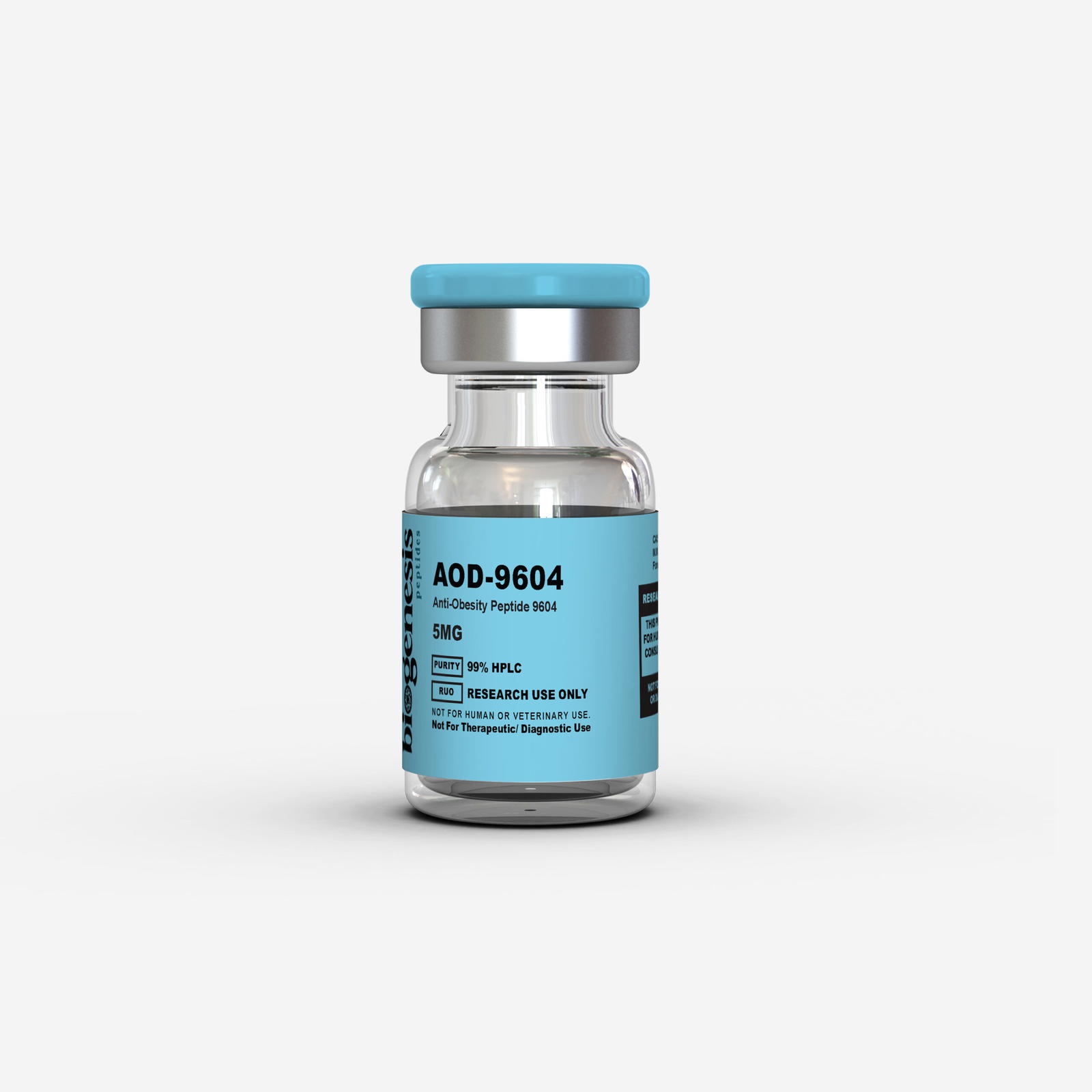Product Usage
THIS PRODUCT IS INTENDED AS A RESEARCH CHEMICAL ONLY. This designation allows the use of research chemicals strictly for in vitro testing and laboratory experimentation only. All product information available on this website is for educational purposes only. Bodily introduction of any kind into humans or animals is strictly forbidden by law. This product should only be handled by licensed, qualified professionals. This product is not a drug, food, or cosmetic and may not be misbranded, misused, or mislabeled as a drug, food, or cosmetic.
AOD-9604 5mg
AOD9604 is a modified fragment of human growth hormone (hGH), specifically derived from hGH 176-191. It was originally developed as an anti-obesity agent and has been extensively studied for its fat-burning (lipolytic) properties.
Original price was: $50.00.$40.00Current price is: $40.00.
Peptides will arrive in a lyophilized (powder) form for maximum stability
Buy 5 for 5% off
Buy 10 for 10% off
Buy 15 for 15% off
OVERVIEW
AOD9604 is a modified fragment of human growth hormone (hGH), specifically derived from hGH 176-191. It was originally developed as an anti-obesity agent and has been extensively studied for its fat-burning (lipolytic) properties.
Research indicates that AOD9604:
- Stimulates fat breakdown (lipolysis).
- Prevents new fat accumulation (lipogenesis).
- Does not increase IGF-1 or insulin levels, making it distinct from full-length hGH.
- Does not trigger antibody production, suggesting potential long-term safety.
Beyond fat metabolism, AOD9604 has been explored for its potential benefits in:
- Heart disease
- Osteoarthritis and cartilage repair
- Metabolic syndrome
Due to these properties, AOD9604 has gained attention as a research candidate in weight management and regenerative medicine.
RESEARCH
AOD9604 and Fat Loss
AOD9604 was initially developed to replicate the fat-burning effects of hGH without affecting other hormones.
- Clinical Trials: A 12-week Phase 2b clinical trial conducted in Australia tested AOD9604 on 300 obese individuals.
- Results:
- Participants receiving AOD9604 experienced three times more weight loss than the placebo group.
- Consistent fat reduction was observed throughout the study.
- Metabolic Safety:
- Unlike full-length hGH, AOD9604 does not elevate IGF-1 or insulin levels.
- This makes it a potential safer alternative for individuals at risk of insulin resistance or diabetes.
AOD9604: Mechanism Beyond Beta-3 Adrenergic Receptors
Early research suggested that AOD9604 works by activating beta-3 adrenergic receptors in fat cells, shifting them into fat-burning mode. However, experiments with genetically modified mice lacking these receptors still showed significant fat loss when administered AOD9604.
This suggests that AOD9604 may function through alternative pathways, possibly by:
- Inducing apoptosis (programmed cell death) in white fat cells.
- Regulating lipid metabolism at the mitochondrial level, increasing energy expenditure.
AOD9604 and Joint Health
Animal studies indicate that AOD9604 may have chondroprotective (cartilage-protecting) effects:
- In osteoarthritis models (rats & rabbits):
- Direct intra-articular injections of AOD9604 improved joint function and reduced pain.
- Histological analysis revealed increased cartilage thickness and better structural integrity.
- Synergistic Effects:
- When combined with other osteoarthritis treatments, AOD9604 enhanced joint repair and functionbeyond standalone therapies.
These findings suggest potential applications in cartilage regeneration and osteoarthritis management.
AOD9604 and Cardiovascular Health
While fat reduction is inherently linked to heart health, studies suggest AOD9604 may provide direct metabolic benefits independent of weight loss.
- Research indicates AOD9604 may enhance heart function in obese individuals.
- Similar to metabolic drugs such as pioglitazone and acipimox, AOD9604 improves lipid metabolism, reducing cardiovascular risk factors.
AOD9604 Safety Profile
AOD9604 has demonstrated a strong safety profile in clinical research:
- No significant adverse effects were reported in human trials.
- Does not increase blood sugar, IGF-1, or insulin resistance.
- Highly bioavailable in both oral and subcutaneous forms.
Important Note:
AOD9604 is currently for research use only and not approved for human consumption.
STRUCTURE
- Molecular Formula: C₇₈H₁₂₃N₂₃O₂₃S₂
- Molecular Weight: 1815.12 g/mol
- Amino Acid Sequence: Tyr-Leu-Arg-Ile-Val-Gln-Cys-Arg-Ser-Val-Glu-Gly-Ser-Cys-Gly-Phe
- Disulfide Bridge: Cys⁷-Cys¹⁵
- CAS Registry Number: 386264-39-7
- PubChem Identifier: 16131447
CITATIONS
- Ng F. M. et al. Metabolic studies of a synthetic lipolytic domain (AOD9604) of human growth hormone. Horm. Res. (2000).
- Stier H. et al. Safety and Tolerability of the Hexadecapeptide AOD9604 in Humans. Journal of Endocrinology and Metabolism (2013).
- Heffernan M. et al. Effects of Human GH and Its Lipolytic Fragment (AOD9604) on Lipid Metabolism in Obese Mice. Endocrinology (2001).
- Zieba R. Obesity: A review of anti-obesity drugs in clinical development. Postepy Hig. Med. Dosw. (2007).
- Kwon D. R. & Park G. Y. Effect of intra-articular injection of AOD9604 on osteoarthritis in rabbits. Ann. Clin. Lab. Sci. (2015).
- Jensen M. D. Potential role of new therapies in modifying cardiovascular risk in overweight patients with metabolic risk factors. Obesity (Silver Spring) (2006).
- News-Medical.net Obesity drug AOD9604 highly successful in trials. (2004).
- Case Western Reserve University Molecular biology of peptide-derived fat loss agents. J. Mol. Endocrinol. (2015).
All products on this site are for Research, Development use only. Products are Not for Human consumption of any kind.
The statements made within this website have not been evaluated by the US Food and Drug Administration. The statements and the products of this company are not intended to diagnose, treat, cure or prevent any disease.
Biogenesis Peptides is a chemical supplier. Biogenesis Peptides is not a compounding pharmacy or chemical compounding facility as defined under 503A of the Federal Food, Drug, and Cosmetic act. Biogenesis Peptides is not an outsourcing facility as defined under 503B of the Federal Food, Drug, and Cosmetic act.

